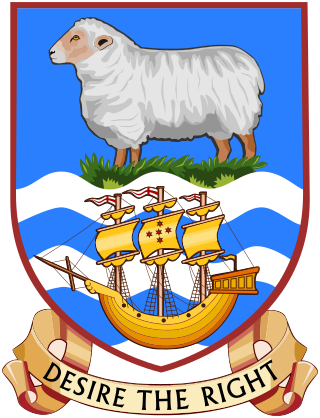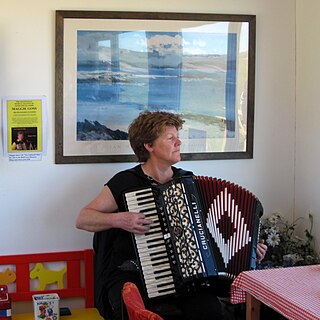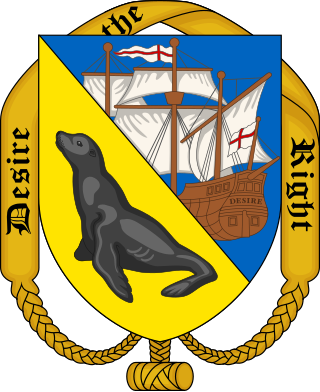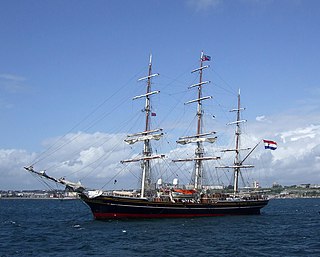Related Research Articles

The history of the Falkland Islands goes back at least five hundred years, with active exploration and colonisation only taking place in the 18th century. Nonetheless, the Falkland Islands have been a matter of controversy, as they have been claimed by the French, British, Spaniards and Argentines at various points.

The politics of the Falkland Islands takes place in a framework of a constitutional monarchy and parliamentary representative democratic dependency as set out by the constitution, whereby the Governor exercises the duties of head of state in the absence of the monarch and the Chief Executive is the head of the Civil Service, with an elected Legislative Assembly to propose new laws, national policy, approve finance and hold the executive to account.
The economy of the Falkland Islands, which first involved sealing, whaling and provisioning ships, became heavily dependent on sheep farming from the 1870s to 1980. It then diversified and now has income from tourism, commercial fishing, and servicing the fishing industry as well as agriculture. The Falkland Islands use the Falkland pound, which is backed by the British pound.
The Falkland Islands currently has three primary means of transport - road, sea and air. However, in 1946, when Sir Miles Clifford arrived as governor, there were no air services, no roads outside Stanley and an indifferent sea service. Sir Miles was instrumental in starting the Falkland Islands Government Air Service in December 1948. The inaugural flight involved a mercy flight from North Arm Settlement to Stanley to bring a girl with peritonitis to life-saving medical help in Stanley. There is now an international airport, a domestic airport, a number of airstrips, a growing road network and a much-improved ferry service between the two main islands.

The Falkland Islands are a British overseas territory and, as such, rely on the United Kingdom for the guarantee of their security. The other UK territories in the South Atlantic, South Georgia and the South Sandwich Islands, fall under the protection of British Forces South Atlantic Islands (BFSAI), formerly known as British Forces Falkland Islands (BFFI), which includes commitments from the British Army, Royal Air Force and Royal Navy. They are headed by the Commander, British Forces South Atlantic Islands (CBFSAI), a brigadier-equivalent appointment that rotates among all three services.

The Falklands War was a ten-week undeclared war between Argentina and the United Kingdom in 1982 over two British dependent territories in the South Atlantic: the Falkland Islands and its territorial dependency, South Georgia and the South Sandwich Islands. The conflict began on 2 April 1982, when Argentina invaded and occupied the Falkland Islands, followed by the invasion of South Georgia the next day. On 5 April, the British government dispatched a naval task force to engage the Argentine Navy and Air Force before making an amphibious assault on the islands. The conflict lasted 74 days and ended with an Argentine surrender on 14 June, returning the islands to British control. In total, 649 Argentine military personnel, 255 British military personnel, and three Falkland Islanders were killed during the hostilities.

Stanley is the capital city of the Falkland Islands. It is located on the island of East Falkland, on a north-facing slope in one of the wettest parts of the islands. At the 2016 census, the city had a population of 2,460. The entire population of the Falkland Islands was 3,398 on Census Day - 9 October 2016.

The culture of the Falkland Islands is essentially analogous to that of British culture. The Falkland Islands have a large non-native-born population, mainly white and from England, but also from Saint Helena.
Sovereignty over the Falkland Islands is disputed by Argentina and the United Kingdom. The British claim to sovereignty dates from 1690, when they made the first recorded landing on the islands, and the United Kingdom has exercised de facto sovereignty over the archipelago almost continuously since 1833. Argentina has long disputed this claim, having been in control of the islands for a few years prior to 1833. The dispute escalated in 1982, when Argentina invaded the islands, precipitating the Falklands War.

Sir Rex Masterman Hunt, was a British Government diplomat and colonial administrator. He was Governor, Commander-in-Chief, and Vice Admiral of the Falkland Islands between 1980 and September 1985. During the Argentine invasion of the islands in 1982, he was taken prisoner and temporarily removed from his position.

The Falkland Islands Defence Force (FIDF) is the locally maintained volunteer defence unit in the Falkland Islands, a British Overseas Territory. The FIDF works alongside the military units supplied by the United Kingdom to ensure the security of the islands.

The Falkland Islands is an archipelago in the South Atlantic Ocean on the Patagonian Shelf. The principal islands are about 300 mi (480 km) east of South America's southern Patagonian coast and about 752 mi (1,210 km) from Cape Dubouzet at the northern tip of the Antarctic Peninsula, at a latitude of about 52°S. The archipelago, with an area of 4,700 sq mi (12,000 km2), comprises East Falkland, West Falkland, and 776 smaller islands. As a British overseas territory, the Falklands have internal self-governance, but the United Kingdom takes responsibility for their defence and foreign affairs. The capital and largest settlement is Stanley on East Falkland.

Lady Elizabeth is a wrecked iron barque of 1,155 tons built by Robert Thompson Jr. of Southwick, Sunderland and launched on 4 June 1879. Robert Thompson Jr. was one of the sons of Robert Thompson Sr. who owned and operated the family ran shipyard J. L. Thompson & Sons. Thompson Jr. eventually left the family business in 1854 to start his own shipbuilding business in Southwick, Sunderland. The ship was built for John Wilson as a replacement for the 658-ton, 1869-built barque Lady Elizabeth which sank off Rottnest Island, Western Australia in 1878.

The Executive Council of the Falkland Islands is the policy making body of the Government of the Falkland Islands, exercising executive power by advising the Governor. It has an equivalent role to that of the Privy Council in the United Kingdom. The first Executive Council for the Falklands was inaugurated on 2 April 1845 by Governor Richard Moody.

Beagle: In het kielzog van Darwin was a Dutch-Flemish television series from 2009 and 2010 initiated by the VPRO in collaboration with Teleac and Canvas, to commemorate the 150th anniversary of Charles Darwin's ground-breaking book On the Origin of Species. The series is centred on an 8-month voyage around the world on board the clipper Stad Amsterdam, which follows the route of the five-year-long voyage of Charles Darwin on board of the ship HMS Beagle between 1831 and 1836. The Stad Amsterdam departed from the English port of Plymouth on September 1, 2009.
Emma Jane Edwards is a British born, Falkland Islands teacher and politician, who served as a Member of the Legislative Assembly for the Stanley constituency from her election in 2009 until she resigned in 2011. She is the eldest daughter of another MLA, Roger Edwards.
A referendum on political status was held in the Falkland Islands on 10–11 March 2013. The Falkland Islanders were asked whether or not they supported the continuation of their status as an Overseas Territory of the United Kingdom in view of Argentina's call for negotiations on the islands' sovereignty.

There were approximately 30,000 land mines laid in British overseas territory of the Falkland Islands by Argentinian forces following their 1982 invasion. Some of the mines were cleared immediately following the successful British operation to retake the islands, but following a series of accidents, demining operations ceased. In the following years the mine fields were fenced off and, with human access limited, became havens for Falklands flora and the native penguin population. The British government ratified the Ottawa Treaty in 1998 that required the removal of all mines within its territory. Demining operations, which had to be carried out by hand due to the climate and local condition, restarted in 2009. The last mines were cleared in November 2020.
Norma Edwards OBE is a Falkland Islands politician. She served for two decades on the Falkland Islands Legislative Council and has been described as a "noted hard-liner" in opposition to Argentine control of the islands.
References
- 1 2 3 "Our Holdings". Jane Cameron National Archives. Archived from the original on 26 April 2014. Retrieved 26 April 2014.
- ↑ "Islands pay tribute to "fierce champion of Falklands' tradition"". MercoPress, South Atlantic News Agency. 12 January 2010. Retrieved 26 April 2014.
- ↑ "Archivist Jane Cameron (1950), died yesterday due to her injuries in the 'Beagle' car accident". Museum Media. 27 December 2009. Archived from the original on 26 April 2014. Retrieved 26 April 2014.